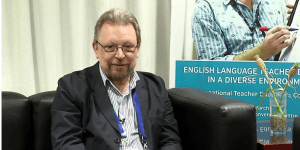FAB8 Kyoto
FAB8 – the latest in a series of international neuroELT conferences dedicated to neuroscience and English Language Teaching – was held at Kyoto Sangyo University in Japan from September 25th to 27th. In this special report from two delegates who attended the conference from overseas, Umes Shrestha reviews the keynote presentations, while Noel Yu reflects on the things that made it an extra-special weekend – and looks ahead to FAB9 in the Philippines next March…
——
The Fantastic FAB8 Conference
Umes Shrestha (Nepal)
As a teacher, you have to decide that you are in charge of the “feelings” in the classroom. This line will forever be cemented in my memory, and the credit goes to Tracey Tokuhama-Espinosa, undoubtedly the conference’s rockstar (pictured above). Her two sessions were power-packed with theoretical yet practical ideas on how to spread social contagion, to make teaching and learning more brain friendly. I really enjoyed her style of delivery as well, which was intensely fiery and yet up close and intimate. Inspired by her sessions, I am going to make sure that students know that I have a higher expectation of them and if they think they can, they will.
The session on the “Neuroscience of Music” by Amanda Gillis-Furutaka was a big affirmation of my own ‘musical’ inclination and my belief that music has a huge role in education. It has a special role in stimulating dopamine release, which leads to better teaching and learning environments. In a very gentle, warm yet convincing way, Amanda probed our own musical-ness and went on to talk about how we not only listen to music, but also visualize, taste, touch and smell music.
Amanda’s suggestion of using music in the classroom in different ways was very helpful. For instance, we can start classes with soothing music to set a positive mood and establish rapport with the students. Similarly, we can use the idea of synesthesia and association to make students engaged in imagination and creativity. Also, how we can use parody and comedy songs to break the pattern and stimulate the brain.
Curtis Kelly’s opening session on “Why our brains love stories” had earlier set the amazing tone for the whole conference. I am taking so many interesting ideas from his session on how to use ‘Digitales’ to fill the classroom with fun, and on how to stimulate students’ brains with short meaningful stories.
The final plenary session by Joseph Shaules on the “Complexity Theory in SLA” was a perfect closure for the conference. His explanation on how language learners judge their success in second language acquisition as ‘Mastery’ or ‘Growth’ was an eye opener. As teachers, we can help learners by giving them a roadmap because language learning is complex, but oftentimes, teachers make this process unnecessarily complicated for the students.
There were several other unforgettable sessions during the two days of the conference, and I’m taking home a whole bunch of insights. One such memorable session was the story sharing session at the end of the first day. It was really intense, inspiring, and sad too. The stories made me question my own beliefs about teaching and my role as a teacher. The stories were great testimonies of teachers who work in extremely difficult circumstances and yet persevere to make a difference.
I made a lot of great friends and it was another highlight of the conference. Besides, spending time in the beautiful city of Kyoto was a privilege. I found the Japanese people are extremely helpful and respectful. I can’t thank enough the wonderful FAB organizing team for their support and enthusiasm.
Umes Shrestha teaches academic writing and business communication to grad and undergrad students at King’s College in Kathmandu, Nepal. He is the co-founder of #PresentationStuffs and an editor at Nelta ELT Forum (https://neltaeltforum.
Personal Blog: http://latebecame.wordpress.
——
What makes a FAB Conference Extraordinary?
Noel Yu (Philippines)
It was a great privilege for me, along with many other delegates from 12 countries, to attend FAB8 in Kyoto.
The FAB organizers believe that a conference is like a classroom – a classroom filled with participants willing to learn. Anchoring on that belief, the organizers incorporated many brain-friendly innovations and methods to boost learning. The ones that I like the most were the “Unconference” Sessions. I find this novel and unique since conferences tend to perceive participants as passive recipients of information. The unconference sessions allow participants to be involved not just by asking and answering questions, but by allowing them to share and discuss views and opinions on any neuroELT topic.
Like any other conferences, one is bombarded with insights, discoveries, plenary speeches, trends, research, dialogs, among other things. These activities are overwhelming, so FAB8 made it an extra-special undertaking to allow participants to get away from the many pressures of a conference. There were the Yoga sessions, Meditation, Kyoto Walk & Talk, and Morning Coffee with a Plenary event before the conference start – such a great warm-up for the brains to be in action.
It was such a delight to hear positive comments coming from the participants themselves. Among these were: (a) on the mood (friendly, positive atmosphere, passion for teaching, great people), (b) great speakers and organizers, and (c) energy breaks (fun, enjoyable and novel).
Truly, it was tremendously amazing to be involved in the powerful discoveries of learning to help learners learn more effectively and joyfully. The FAB8 neuroELT conference helped all participants to acquire various perspectives to augment dimensions of our teaching competencies as educators such as how to guide brains for active learning, sustained attentiveness and effective attention.
Let us continue the legacy of promoting international cooperation, disseminating ideas, and facilitating academic endeavors among individuals dedicated to the teaching-learning process.
Let us come together for other brain-friendly sessions and novel ideas in our upcoming FAB9: “Brains by the Beach” in the Philippines. Join us at Best Western Sand Bar Resort in Mactan, Cebu City, Philippines on March 10th-12th 2016.
For the very first time in the history of FAB, the conference will be by the beach. So expect a more engaging and relaxing conference atmosphere while learning. “It is more fun in the Philippines!”
Noel Yu is the senior academic learning consultant of International TESOL Education and Consultancy Corporation in Makati, Philippines. He is the former chairman of the Department of Languages and Literature, and the director of the English language program of the University of San Jose-Recoletos, Cebu. Noel is also vice-president of the American Studies Association of Cebu, and a Philippine Association of Language Teaching board member. At FAB8, he gave a book review of “Flourish” by Martin Seligman.
——
More info
Web site: www.fab-efl.com
FAB9 call for papers: round 1, November 1st-30th 2015; round 2, December 1st 2015-January 15th 2016.




